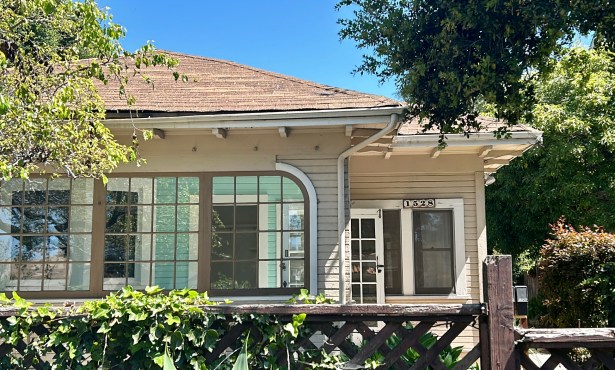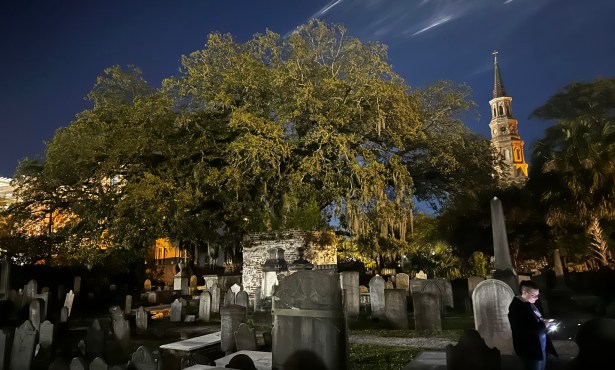Santa Barbara’s Sonic Satirists
Listening to Off the Air, Densely Constructed Improv Comedy from KCSB’s Past
Having hosted countless hundreds of diligently unorthodox broadcasters since 1961, KCSB has a past filled with some of the most creative radio ever.
Excited by the medium’s possibilities, many former KCSBers tried to exploit its every characteristic. Alas, quite a few of them also embraced the medium’s utter transience: If you didn’t hear their shows live, you never would. In the days before Web streaming and easy recording, you had to have been in Santa Barbara, near a radio, and aware enough to be tapped into the neat stuff going on at KCSB, or you’d miss out entirely.
This is especially painful for freeform radio fans who weren’t even alive back then. Born in 1991 or 1992, the freshmen entering UCSB this fall are extremely unlikely to have heard a KCSB show like Off the Air. The program ran from 1989 to 1994, treating its listeners to a weekly hour of densely constructed improvisational comedy that often pushed right up against the edges of sanity.
As luck would have it, some of the 60 episodes produced survive in the KCSB archives. They’re a testament to the enormous impact of words skillfully intercut with music (an impact public radio titans like This American Life base themselves upon to this day), and the psychologically absorbing effect of “soundscapes” (to use an awfully clichéd term but I don’t have anything better) composed of voices, sound effects, found clips, and noise.
I’d been told Off the Air was something of a “psychedelic radio show,” yet it came so long after any historically psychedelic era that I wasn’t sure what to expect. Produced and acted by a large, ever-shifting group including, but not limited to, Dave LaDelfa, Jon Leidecker, Alex Zisch, Bryan Stokes, Tim Meany, Chris Ball, Ryan Gold, Ted Mills, and Scott Easley—several of those names still regularly heard in Santa Barbara art and media circles—the program had its roots less in anything directly psychedelic than in the sort of fringe broadcasts made when people were still regularly seeking out psychedelic experiences. Think of the motormouth, sound-rich pieces of radio satire crafted by Joe Frank or the Firesign Theater in the 1960s and 1970s, and you’ve got an idea of Off the Air’s tradition.
Whatever its origins and whomever its forebears, the show turns out to be one of the most compelling things I’ve ever heard from the KCSB studio. It’s not just yammering, it’s not just jokes, it’s not just performance, and it’s not just words with music. It’s more like one big, intricate sonic collage, bringing together layer upon layer of character voices, ambient sounds, audio ripped from other sources, and, naturally, the occasional industrial drone. While Off the Air’s producers didn’t max out all these dimensions all the time, they certainly seem to have realized they could do so at any moment. Just within an individual episode, they’ll slide from old-time radio pastiche to modern media lampoon to veritable aural kaleidoscope.
Each hour comprises about 20 short segments unified by a broad theme. They don’t come much broader than, for example, “D’Art Show” of July 6, 1990. An increasingly insane exploration of the question of what is and is not art, the episode attacks the issue angle after parodic angle: a fake call-in art advice show; a prim BBC-esque segment on the performance artist “Angelo Silverstein,” whose works include “Destitute,” “Help,” “Cardboard Box,” and “Hypothermia #2,” which is an ad for 1-900-56-ANGST, a tortured artists’ hotline. The production, laden with a host of echoing, stuttering, time-warping tape effects, comes off a lot like something avant-garde composer Steve Reich would’ve done. Presuming Steve Reich had been interested in cracking goofy jokes over ominous sonic backgrounds, that is.
Taking that ominous feel to an extreme—and this show provokes the best balance I’ve ever felt of laughter and unease—is the episode of January 6, 1991, “The Goldberg Variations.” If there’s a direct relationship to the eponymous Bach pieces, I can’t identify it, though I wouldn’t be surprised if they were both created with a comparable amount of complexity. While both were no doubt wrought with a strong attention to detail, Bach never had to work with tapes of his grandparents’ conversations. He certainly never had to take these recordings of elderly chatter—chatter about golf, chatter about the exploits of a certain “cousin Ronnie,” chatter about whether Italian women shave under their arms—and put them into music.
“All art constantly aspires towards the condition of music,” wrote 19th-century critic Walter Pater. That’s clearly true of the sort of broadcast art practiced on Off the Air. In an episode like this one, it not only aspires but attains the musical condition. Using only the comparatively primitive recording and editing methods available at the dawn of the 1990s, the producers somehow managed to cut, paste, loop, warp, and transform the words of Grandma Sarah, Grandpa Zaggy, Grandma Laura, and Grandpa Bernie (as they’re credited at the hour’s end) until they became their own abstract art form. Listen to the oldsters’ remarks on Bing Crosby and Ethel Merman dissolve into a metallic grind, and you won’t be surprised to learn that at least one member of the Off the Air crew was a UCSB music student.
The show could even get somewhat topical, as heard on the episode of November 3, 1991, “Yak Attack: A Report Backward on the Cold War.” Somehow both the most straightforward and the most bizarre installment retained in KCSB’s archives, it offers, with the program’s signature creeping absurdism, a dizzying array of sketches on U.S.-Soviet relations. Some are surprisingly serious and intellectually engaged with the ideologies at play; others achieve a Borscht Belt-grade silliness. One moment you’ve got a juxtaposition of found commentaries on capitalism and communism, and the next you’ve got a couple of Russians haplessly trying to buy a “cheese hamburger” in the States. Inexplicably, the transition is seamless.
As such popular satirical operations as The Onion have demonstrated, our times are no less ripe for ridicule than the early 1990s were. Not only that, but the astonishing march of personal media technology in the past two decades has made it infinitely easier to put together the very same sort of elaborate, information-heaped radio productions. While it’ll never be actually easy to do it, at least it’s no longer quite so painstaking a task in this age of flexible, computer-based audio editing. Who, then, dares pick up the gauntlet where Off the Air left it?



